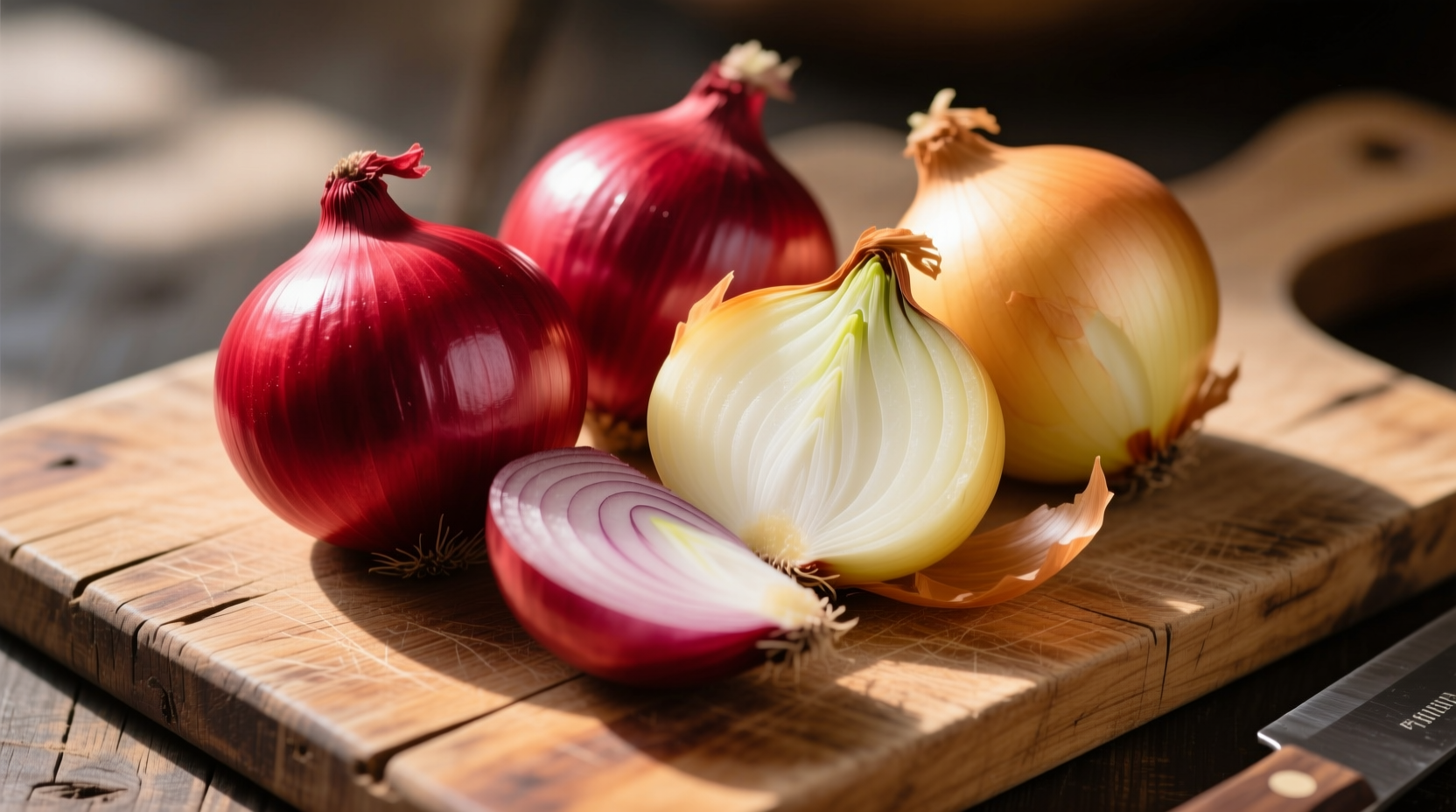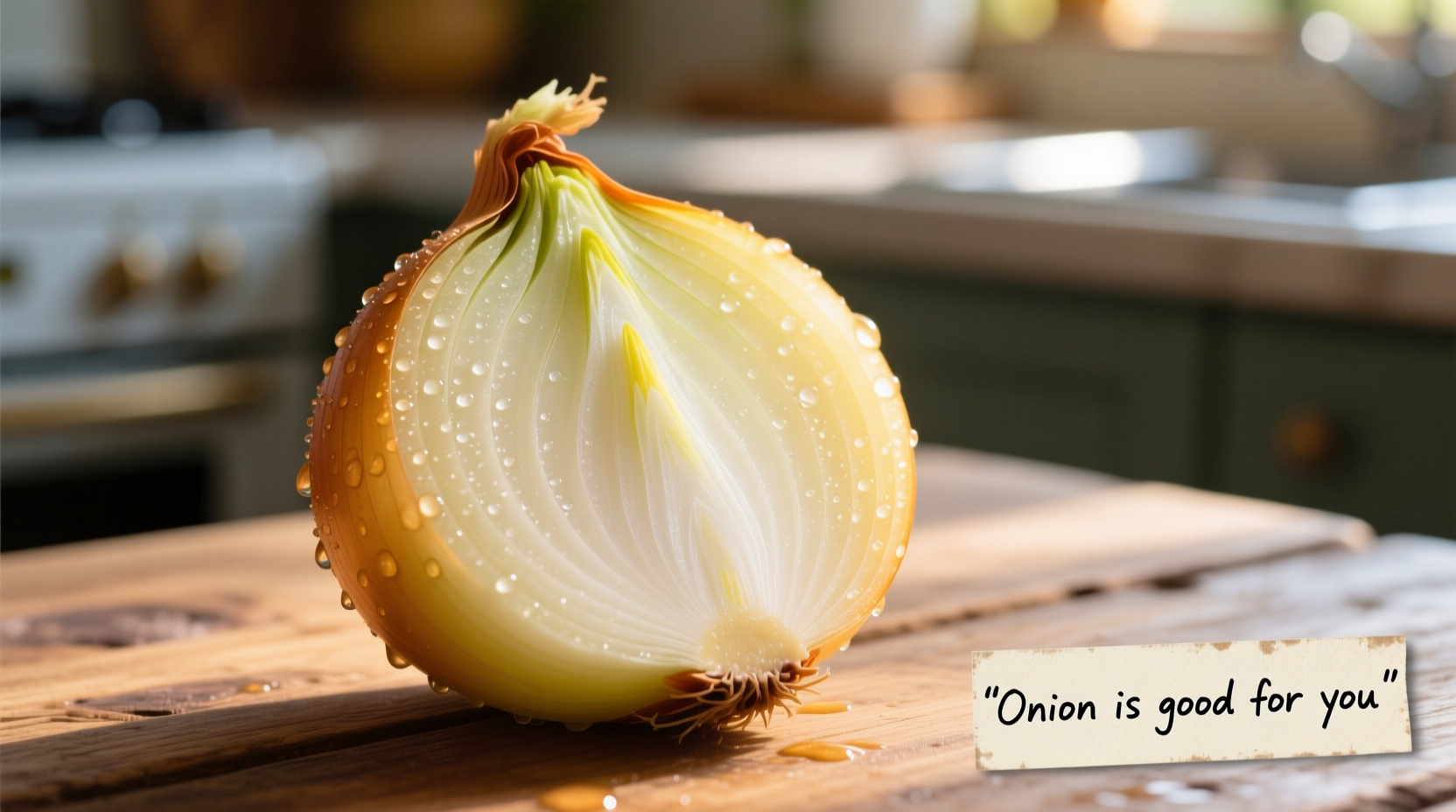When you reach for that pungent bulb in your kitchen, you're grabbing one of nature's most potent health allies. Onions aren't just flavor enhancers—they're nutritional powerhouses with scientifically validated benefits that impact multiple body systems. Research shows regular onion consumption correlates with reduced risk of chronic diseases while supporting day-to-day wellness through their unique phytochemical profile.
What Makes Onions Nutritionally Special
Onions contain a distinctive combination of compounds that work synergistically to promote health. Unlike many vegetables, they're particularly rich in organosulfur compounds and flavonoids, especially quercetin—a potent antioxidant with impressive research backing its health effects. These compounds survive cooking better than many nutrients in other vegetables, making onions valuable whether raw or cooked.
| Nutrient | Per 100g Raw Onion | Daily Value % |
|---|---|---|
| Calories | 40 | 2% |
| Vitamin C | 7.4mg | 12% |
| Vitamin B6 | 0.12mg | 7% |
| Folate | 19μg | 5% |
| Potassium | 146mg | 4% |
| Dietary Fiber | 1.7g | 6% |
Data source: USDA FoodData Central
Cardiovascular Protection You Can Count On
Onions contribute significantly to heart health through multiple mechanisms. Their organosulfur compounds help prevent blood clot formation while improving blood vessel function. A comprehensive review published in Nutrients found that regular allium vegetable consumption (including onions) associated with a 15-20% reduced risk of cardiovascular disease. The quercetin in onions helps lower blood pressure by improving endothelial function—the lining of your blood vessels.
Unlike some heart-healthy foods that require large quantities for benefit, onions deliver cardiovascular protection at realistic consumption levels. Just half a cup of chopped onions daily provides sufficient compounds to make a measurable difference in vascular health markers according to clinical research from the American Heart Association.

Anti-Inflammatory Powerhouse
Chronic inflammation underlies many modern diseases, and onions contain multiple compounds that combat this process. Quercetin inhibits the production of inflammatory enzymes like cyclooxygenase, similar to how some medications work but without side effects. Research from the National Institutes of Health demonstrates that onion extract significantly reduces inflammatory markers in human trials.
What makes onions particularly valuable is their dual action—they don't just reduce existing inflammation but also help prevent its development. The chromium in onions improves insulin response, which indirectly reduces inflammation associated with blood sugar fluctuations. This makes onions especially beneficial for those managing metabolic conditions.
Bone Health Benefits Beyond Calcium
While dairy gets all the attention for bone health, onions offer unique skeletal benefits. A landmark study following postmenopausal women found that regular onion consumption associated with a 20% lower risk of hip fractures. The mechanism appears related to onions' ability to reduce oxidative stress in bone tissue and inhibit破骨细胞 activity—the cells that break down bone.
Unlike calcium supplements which provide a single nutrient, onions support bone health through multiple pathways. Their GPCS (gamma-L-glutamyl peptides) compounds stimulate osteoblast activity—the cells that build new bone tissue. This multi-targeted approach makes onions a valuable addition to any bone-supportive diet.
Practical Ways to Maximize Onion Benefits
To get the most health value from onions, follow these evidence-based preparation tips:
- Let cut onions rest: After chopping, wait 5-10 minutes before cooking to allow maximum allicin formation
- Choose red onions: They contain up to 11 times more antioxidants than yellow varieties according to USDA research
- Pair with healthy fats: The fat-soluble compounds in onions absorb better when consumed with olive oil or avocado
- Don't overcook: Light sautéing preserves more beneficial compounds than prolonged boiling
When Onion Benefits Apply (and When They Don't)
While onions offer impressive health advantages, their benefits operate within specific parameters. Research shows the cardiovascular benefits are most pronounced when onions are consumed regularly as part of a Mediterranean-style diet rather than in isolation. The cancer-protective effects appear strongest for gastrointestinal cancers when onions are eaten raw.
Certain populations should moderate intake: those with irritable bowel syndrome may experience discomfort from onion's fructans, and people on blood thinners should maintain consistent consumption rather than fluctuating intake levels. These limitations don't negate onion's benefits but highlight the importance of context in nutritional science.
Simple Ways to Incorporate More Onions Daily
You don't need dramatic dietary changes to reap onion benefits. Try these practical additions:
- Add raw red onion slices to sandwiches and burgers for crunch and nutrition
- Include caramelized onions in omelets or frittatas for savory depth
- Blend raw onion into salad dressings where the oil helps extract beneficial compounds
- Add diced onions to soups, stews, and sauces as a flavor foundation
- Try pickled onions as a tangy condiment for tacos and grilled meats
Start with smaller amounts if you're sensitive to onions, gradually increasing as your digestive system adapts. Most people can comfortably enjoy one medium onion daily across multiple meals without digestive issues.
Conclusion: Onions Deserve Their Superfood Status
Onions represent one of the most accessible and scientifically supported functional foods available. Their combination of cardiovascular protection, anti-inflammatory action, and bone support makes them valuable for nearly everyone. Unlike many trendy superfoods, onions are affordable, widely available year-round, and versatile in preparation. By understanding how to select and prepare them for maximum benefit, you can harness their full nutritional potential as part of your daily eating pattern.
Frequently Asked Questions
Do cooked onions retain their health benefits?
Yes, cooked onions maintain significant health benefits, though some compounds like quercetin decrease with prolonged high-heat cooking. Light sautéing preserves more beneficial compounds than boiling. Red onions retain higher antioxidant levels even after cooking compared to yellow varieties. The organosulfur compounds responsible for cardiovascular benefits remain largely intact through moderate cooking.
How much onion should I eat daily for health benefits?
Research suggests consuming approximately ½ to 1 cup of chopped onions daily provides measurable health benefits. This equals about one medium onion divided across meals. Studies showing cardiovascular benefits typically used this range. You don't need to consume large quantities at once—spreading intake throughout the day enhances absorption of beneficial compounds.
Are red onions healthier than yellow or white onions?
Yes, red onions generally contain higher levels of beneficial compounds. USDA research shows red onions have up to 11 times more antioxidants than yellow onions and significantly more quercetin. The anthocyanins that give red onions their color provide additional anti-inflammatory benefits not found in other varieties. However, all onion types offer valuable health properties, so variety in your consumption provides the broadest benefit.
Can onions help prevent cancer?
Multiple population studies show an association between regular onion consumption and reduced risk of certain cancers, particularly gastrointestinal cancers. The organosulfur compounds in onions inhibit tumor growth and promote cancer cell death in laboratory studies. While onions alone won't prevent cancer, they're considered a valuable component of a cancer-preventive diet when consumed regularly as part of a plant-rich eating pattern.











 浙公网安备
33010002000092号
浙公网安备
33010002000092号 浙B2-20120091-4
浙B2-20120091-4